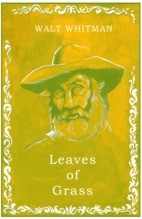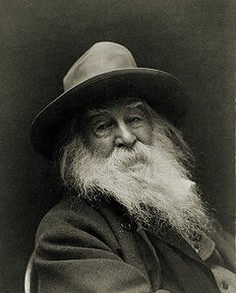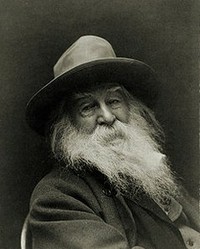
Review of Walt Whitman's Leaves of Grass
by Tbonius
A review of Leaves of Grass, by Walt Whitman - Father of American Poetry
Introduction to Leaves
 If Walt Whitman were alive today, he'd probably be publishing his poetry in some cabin in the woods... on the internet. In 1855 Whitman self-published his collection of poems called Leaves of Grass, which, since he was never quite finished with his work, was tweaked and edited between six and nine times over course of his life.
If Walt Whitman were alive today, he'd probably be publishing his poetry in some cabin in the woods... on the internet. In 1855 Whitman self-published his collection of poems called Leaves of Grass, which, since he was never quite finished with his work, was tweaked and edited between six and nine times over course of his life.
The result of his lifetime’s work is a volume of poems that helped disentangle American poetry from its stifled past and to help it come into its own. To paraphrase literary critic Harold Bloom, more than Moby Dick and Adventures of Huckleberry Finn, Whitman's book Leaves of Grass is the centerpiece in the "secular Scripture of the United States."
Origins
Leaves of Grass originated 10 years before its publication with an essay by Transcendentalist Ralph Waldo Emerson, titled "The Poet", which called out for a new voice of American poetry: that which embodied the spirit of the age. Some of the best-known poems from this book are "Song of Myself" and "I Sing the Body Electric."
The Open Air
Whitman wanted his poetry to be read in the "open air," so he had it printed small enough to fit in a reader's pocket . He stated: "I am nearly always successful with the reader in the open air."
Leaves of Grass is also a little known pun: "Grass" was what publishers dubbed works of literature that were of low quality, and "leaves" were another name for pages of a book. So, humbly, Whitman titled his book something meaning an inferior work of literature - though now his book of poems is a cornerstone of American literature.
Obscene... Really?
Many of Whitman's critics called Leaves of Grass "obscene literature" when it first appeared, accusing its anonymous author of homosexuality. Poetry in that day was supposed to be very allegorical, so Whitman's references to his body, to sensuality and sexual love, were way more than Victorian mores could handle back then.
As a fan of Henry Miller, I find it no wonder that Miller was such a devotee to Whitman. Miller, whose writing would also be called “obscene,” also embodied the acceptance of life - the sensuality and freedom that lived at the core of each author is liberating - though each caused a huge stir in his day. Miller loved the work, though he wasn't sure it would be understood by readers as early as the 1930‘s.
Walt Whitman
Age 67
 Walt Whitman as an Old Man Wikipedia |
A Masterpiece
It might seem difficult to grasp at some points, the language having grown over with moss from our current mode of language, but in my opinion, Leaves of Grass is a masterpiece of American literature: a song to America itself.
Click here for a free download of Leaves of Grass, where you can find a in PDF, Kindle, or Audiobook format.
Leaves of Grass by Walt Whitman
Order on Amazon
 | Leaves of Grass: The "Death-Bed" Edition (Modern Library) Abraham Lincoln read it with approval, but Emily Dickinson described its bold language and themes as "disgraceful." Ralph Waldo Emerson found it "the most extraordinary piece ... Modern Library / |
 | Leaves of Grass and Selected Prose (Modern Library 97)Modern Library / |
 | Whitman: Poetry and Prose (Library of America College Editions) Contains the first and "deathbed" editions of "Leaves of Grass," and virtually all of Whitman's prose, with reminiscences of nineteenth-century New York City, notes on the ... Library of America / |
 | Leaves of Grass Leaves of Grass, first published in 1855, contained twelve long untitled poems, but Whitman continued to expand it throughout his life.Whitman's poetry was unprecedented in ... Simon & Brown / |
You might also like
Siegfried Sassoon: Innocence Lost in the Trenches of the Grea...Decorated for bravery, Siegfried Sassoon changed the war poetry genre forever...
The WWI War Poems of Wilfred Owen: The Poetry is in the PityWilfred Owen is arguably Britain's greatest ever war poet. His words took his...



 A Review of Pride and Prejudiceon 12/21/2011
A Review of Pride and Prejudiceon 12/21/2011
 Review of Grimm's Fairy Taleson 12/20/2011
Review of Grimm's Fairy Taleson 12/20/2011
 Adventures of Sherlock Holmes Sherlock Holmes Book Reviewon 12/14/2011
Adventures of Sherlock Holmes Sherlock Holmes Book Reviewon 12/14/2011
 A Christmas Carol by Charles Dickenson 12/13/2011
A Christmas Carol by Charles Dickenson 12/13/2011



Comments
Since I was an English major, I read Leaves of Grass in college. I was just telling someone on here yesterday that I wish I had kept my Norton Anthology. I've got to get back into reading these great works of literature.
Once upon a time, when I was an undergrad (in the sciences) I wanted to read Whitman but could not get past the first couple of pages. Thanks for the introduction to the man - it reminds me of why I wanted to read him. I'll download his book and hopefully get a chance to read it.
Thanks for your feedback. For better or worse, I think we're at that crossroads for sure. The deluge of self-published ebooks is imminent. :)
I like the idea that Whitman would probably be publishing his work online if he were alive today. Perhaps we are at another crossroads in American literature, one in which poets and authors take control of their works.
However, I also appreciate that Whitman revised and tweaked his work over his lifetime. A good writer always tries to perfect his or her work.